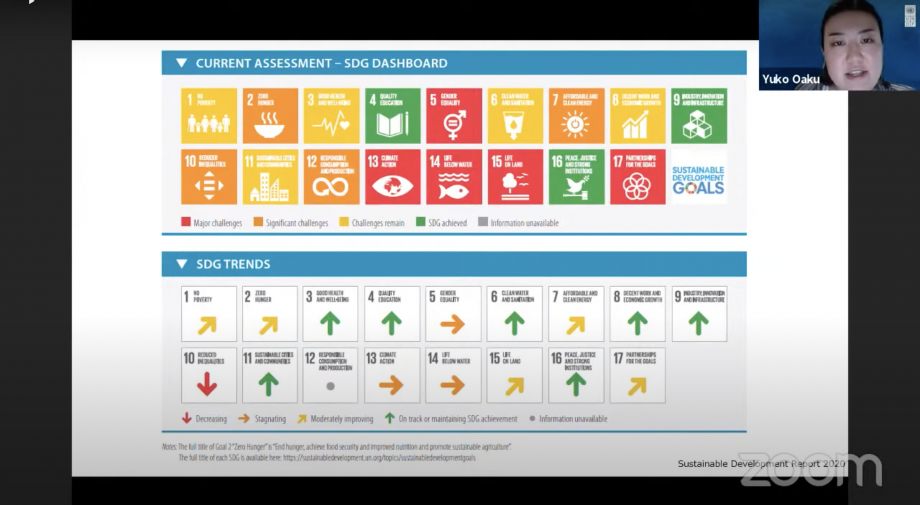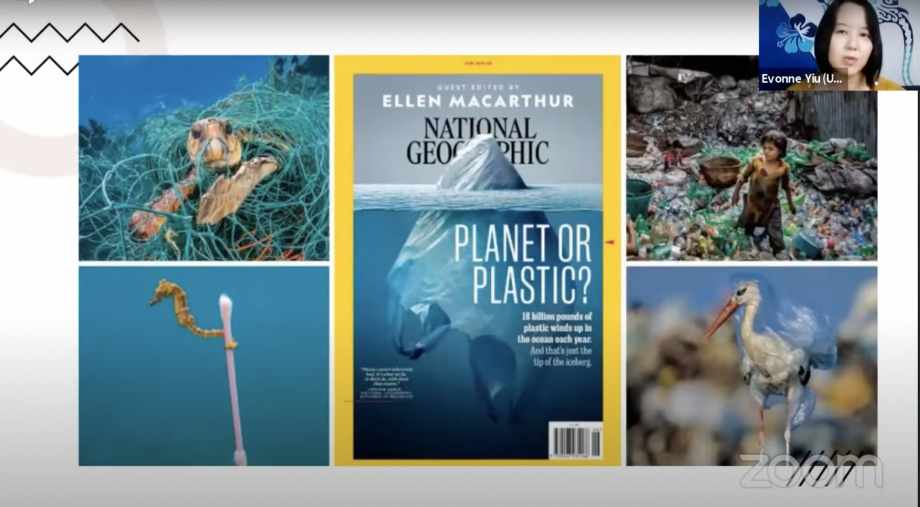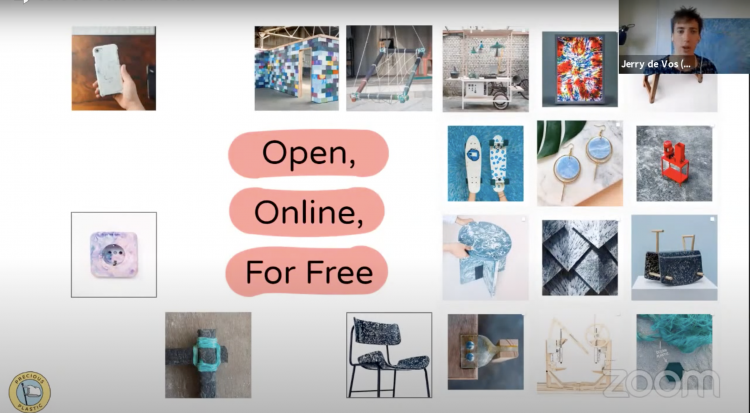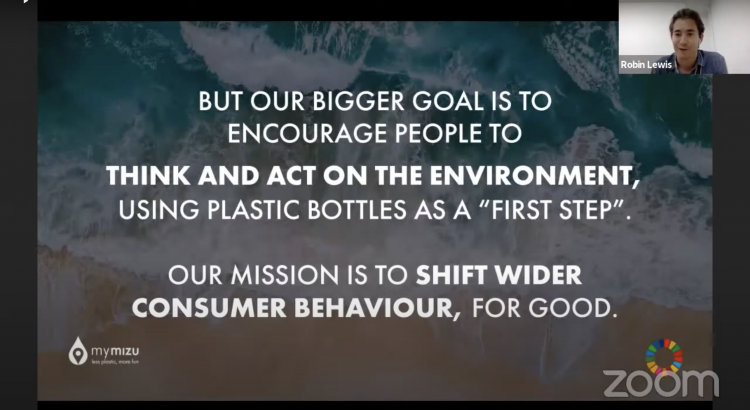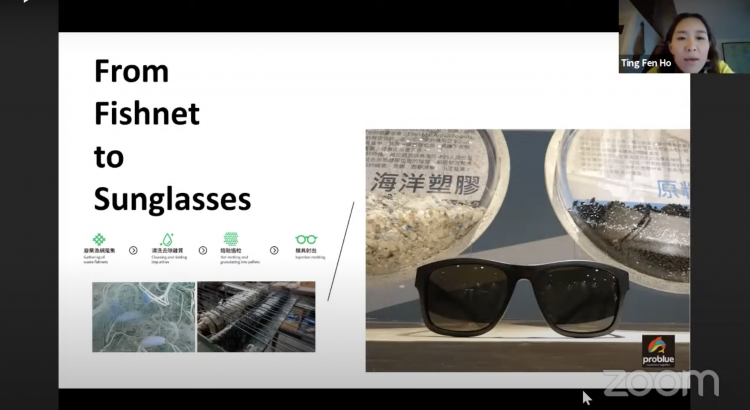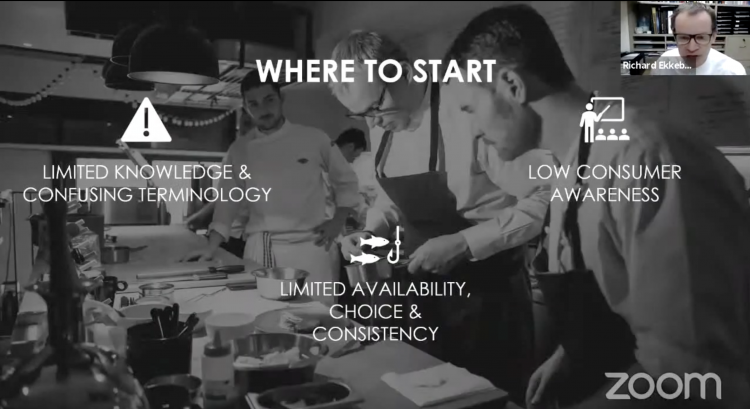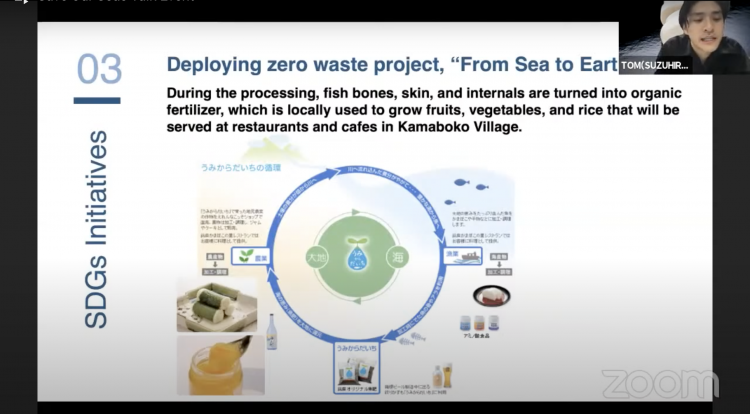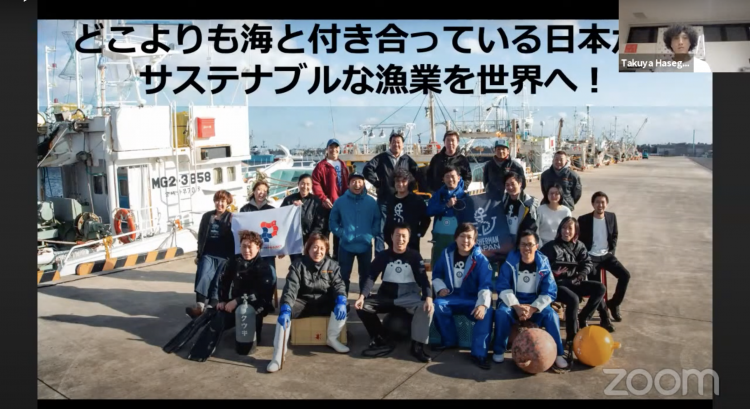Event report
August 4, 2020
Few nations have as close a relationship with the sea as Japan, which even observes a holiday, Marine Day, in celebration of the ocean’s blessings. This year FabCafe Tokyo marked the Marine Day holiday by hosting an online Save Our Seas mini jam, where ocean-lovers around the world gathered for an online design thinking workshop to dig into life under water challenges and see what opportunities exist.
A day earlier, FabCafe Tokyo held an online talk event to establish a platform for discussion. Featuring eight ocean-sustainability practitioners and attended by more than 100 people, our talk event was structured around two key issues that are impacting our oceans today: plastic waste and sustainable fishing.
Introducing the issues
Our starting point was the need to conserve ‘Life Below Water’, which is enshrined as one of the Sustainable Development Goals (SDGs). Yuko Oaku of the United Nations Development Programme (UNDP) gave us a valuable introduction here, with examples drawn from her own experience in the Maldives.
We then received a stark reminder of the current plight of our oceans. Dr. Evonne Yiu, a researcher at the United Nations University Institute for the Advanced Study of Sustainability, talked us through some of the scenarios we’re faced with, including a potential fish-to-plastic waste ratio of 1:1 by 2050. Dr. Yiu believes that simply rethinking our own patterns of consumption can avert this outcome, a theme that emerged strongly in the talk sessions to follow.
The first session looked at some innovative ways of reducing marine pollution, with three speakers each bringing their own distinct take on how to engage consumers in the ongoing debate around plastic waste. The second session tackled sustainable use of marine resources, particularly in Japan, and we heard a lively discussion among representatives of the fishing, food processing and restaurant industries.
Let’s dive into both sessions and surface some of the main ideas and insights brought forth by the various practitioners.
Session I: Reducing Marine Pollution
Session I Moderator:
Kelsie Stewart, FabCafe
Speakers:
- Jerry de Vos, Precious Plastics Product Designer (The Netherlands)
- Ting-Fen Ho, Leader, Sustainable Design Group, Plastics Industry Development Center (Taiwan)
- Robin Lewis, Co-founder, mymizu (Japan)
All of our Session I speakers belong to social enterprises that aim to reduce waste at different stages in the plastic life cycle. Jerry de Vos builds machines and corresponding product molds that make plastic recycling fun and accessible for the general public. Ting-Fen Ho works with manufacturing companies to design and launch products made from fish nets, agricultural styrofoam, and plastic beach litter. Robin Lewis is co-founder of mymizu, a service that helps users locate free water refills and so reduces consumption of single-use plastic bottles.
Our speakers had to overcome surprising objections at first:
Robin: “When we first launched mymizu, people said it wouldn’t work in Japan because most people aren’t willing to go into a cafe to get water. There’s also a fundamental lack of understanding about what happens to plastic at the end of life. The official recycling rate for plastic in Japan is 85%, but we are burning or exporting the majority of the so-called recycled plastic.”
Jerry: “In the beginning, we faced a lot of prejudice from people who said it was just a hobby project. The problem for them was ‘What’s your business model? You’re giving too much away for free!’ We needed to get them to understand that our goal was not to make money, but to have more plastic recycled. And if that’s through somebody else copying or stealing our ideas, then perfect.”
Sustainability issues aren’t always enough to move people:
Ting-Fen: “You can’t ask people to buy your product because it’s sustainable. You have to make the product precious by making it really beautiful or attaching it to some story so people will not throw it away. Adding value to the product is key.”
Robin: “We try to pull people rather than push. Even though there’s a massive crisis around plastic waste, we try to keep all our messaging positive and fun. Appealing and exciting initiatives will ultimately push us forward. I see a lot of things happening at the government level here in Japan. We recently introduced a plastic bag charge and, while it’s a small step, it’s also an indicator.”
Working with cities can be a great force-multiplier:
Robin: “We’re currently very fortunate to be working with Kobe City, helping to solve two key issues, which are dehydration and plastic disposal. They have the knowledge, the network, and crucially the trust of local people. It makes things ten times easier. So that has been a really positive experience.”
Jerry: “For us, working with municipalities is always two-sided. On the one hand, it can be difficult because we really like the bottom-up approach where people find it for themselves. On the other hand, if there are people demanding this from their municipality, it can be very interesting to have it city-wide. You can streamline the process and this opens up a lot of possibilities for optimising the process of recycling plastic.”
Real change means starting small and scaling upwards:
Robin: “We’re starting off with water because everyone needs water to survive. But water is just the beginning. What we want is to start building circular processes in society.”
Ting-Fen: “We’re working with Taiwanese clients on mostly one-time projects. First of all, we need to gain market acceptance, which means people agree with what we are doing. We need to have that economic success in order to grow.”
Conclusion
Our speakers are all trying to change consumer behaviour so that plastic stays out of our marine environments. They each faced challenges at first, but made progress by choosing their battles carefully and, where possible, aligning their interests with powerful partners. We applaud their efforts and look forward to seeing them succeed on an even greater scale.
Session II: Sustainable Use of Marine Resources
Session II Moderator:
Shin Kikuchi, Ikimono Co.
Speakers:
- Takuya Hasegawa, Community Leader, Fisherman Japan
- Tomohiro “Tom” Suzuki, Chief Marketing Officer, Suzuhiro Kamaboko Co., Ltd.
- Richard Ekkebus, Culinary Director, Landmark Mandarin Oriental, Hong Kong
Our Session II speakers represent the diverse range of interests that need to be accommodated in order to realise a truly sustainable fishing industry. They include an organisation that promotes fishing as an occupation to young people in northern Japan, a company which manufactures the processed seafood delicacy ‘kamaboko’, and a Hong Kong restaurant which imports Japanese seafood and has won awards for its sustainable sourcing. These various stakeholders represent the essential touch points in a largely unregulated supply chain for the sustainable production of seafood and other ocean-products.
Seafood consumption is falling in Japan, but rising in Hong Kong:
Takuya: “Fewer Japanese people are cooking fish at home, because it creates a lot of mess. There’s also a decline in the knowledge of how to cook fish.”
Richard: “The consumption of seafood in Hong Kong is always going up. I try to focus on ethically farmed or sustainably caught fish, but also to shift the paradigm towards vegetables with protein. Hong Kong is a very protein-heavy city, both seafood and meat, and that is a non-sustainable model. If everyone ate the way we do in Hong Kong, we would need two more planets.”
Sustainability in Japan is closely connected to avoiding food waste:
Tom: “Our company makes kamaboko (surimi), which has a history of around 900 years and began as a technique to use fish that has been overfished. We have a lab that explores ways to make new products out of fish that aren’t popular with consumers. We even have a project to make china out of fish bones.”
Takuya: “There’s also a history of creating festivals or marketing around certain types of fish, like sanma (Pacific saury) and eel, to increase their value so they don’t go to waste.”
Each end of the supply chain has its own reason to reduce overfishing:
Takuya: “Japanese fishermen have practised resource management in various ways because it’s directly connected to their livelihood.”
Richard: “We have a powerful position as chefs, because we can influence consumer behaviour. It’s complicated because guests come to restaurants to eat bluefin tuna or eel, but I do believe we have an ethical responsibility. Resources are limited and we need to show some patience for one year, so that fish stocks can reestablish themselves.”
In Japan, sustainability is perceived as continuity. Elsewhere, it can be a source of business competitiveness.
Tom: “Kamaboko has existed as a technique for 900 years, and I’m the eleventh generation to manage our family business called Suzuhiro. My biggest challenge is how we can pass on this culture to the next generation.”
Takuya: “Our culture is based on ‘mottainai’, or trying to be the most efficient we can with the least resources. We want to pass that mentality to the next generation. There’s also a lot we can do with technology, and we want to spread that outside of Japan.”
Richard: “Sustainable seafood is just a small part of how to create a sustainable business. It’s a very fast-moving field where you constantly learn how to be a better operator. What drives us everyday is making sure that we stay at the forefront of making the right decisions that make as little as possible impact on our planet.”
Conclusion
We’re incredibly privileged to have a fishing industry advocate, an historic Japanese company, and an award-winning chef all share a stage to discuss sustainability. It proved to be a unique meeting of minds, just as it was uncommon to have speakers from three different countries share their experience of addressing marine pollution in their own communities.
Due to Covid-19, FabCafe is using online platforms more than ever to connect diverse voices in debating some of the most critical challenges (and opportunities) in our communities today. This also forms part of our own journey towards answering our question “What do you fab?” in ever more diverse ways. Stay tuned for future events!
Organized by FabCafe
Graciously supported by UNDP, Digital Society School, the Global Goals Jam community and Bridge Terminal

-
David Willoughby
Freelance writer based in Tokyo.
Freelance writer based in Tokyo.

